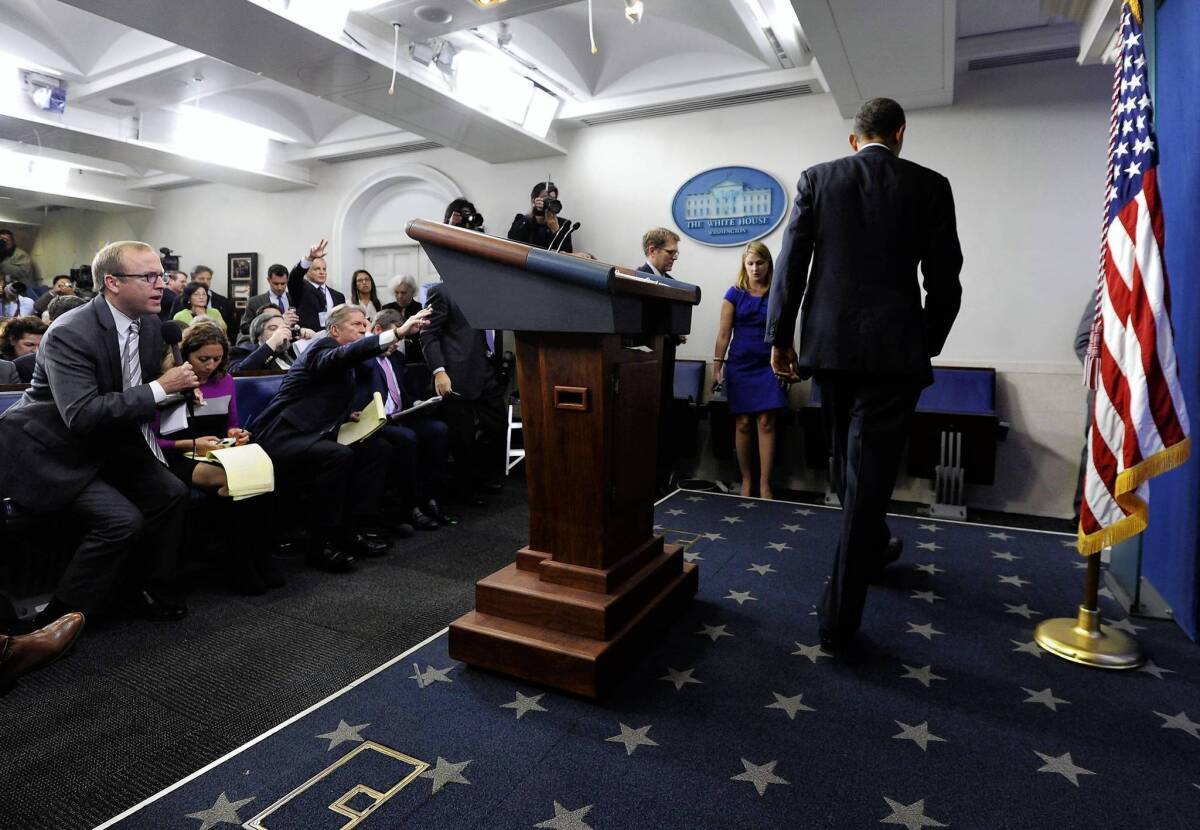Obama open to negotiations if House GOP cooperates

WASHINGTON — President Obama and the Senate raised the pressure Tuesday on House Republicans to end the government shutdown and avert a potential default on the national debt, but House Speaker John A. Boehner dismissed those moves as a demand for an “unconditional surrender.”
At a hastily arranged and lengthy news conference at the White House, Obama suggested he would negotiate with House Republicans if they passed bills to reopen the government and raise the debt ceiling for a limited time.
Senate Democrats offered a different approach, aiming to send the House a bill to suspend the debt limit until the end of 2014. If a handful of Senate Republicans signed on, the bill could land on the House floor early next week, just ahead of the deadline the Treasury Department has set for raising the $16.7-trillion debt limit.
The varied strategies and Boehner’s speedy response came eight days into the budget impasse as leaders on both sides staged fiery public appearances but floated ideas that potentially could provide a way out.
So far, Democrats on Capitol Hill and in the White House have insisted they will not formally negotiate until Boehner allows the government to open and removes the threat of default, something the Ohio Republican has appeared unwilling to do for fear of further splintering his Republican caucus.
Obama argued that refusing to lift the debt ceiling before the Oct. 17 deadline would be “insane, catastrophic, chaos,” attributing those descriptions to business leaders. “The American people do not get to demand a ransom for doing their jobs,” he said. “You don’t get a chance to call your bank and say, ‘I’m not going to pay my mortgage this month unless you throw in a new car and an Xbox.’”
He cast himself as a rational player in the budget drama.
“If reasonable Republicans want to talk about these things again, I’m ready to head up to the Hill and try,” he said. “But I’m not going to do it until the more extreme parts of the Republican Party stop forcing John Boehner to issue threats about our economy. We can’t make extortion routine as part of our democracy. Democracy doesn’t function this way.”
Obama said he would sign short-term bills to open the government and raise the debt limit and then negotiate on whatever issues House Republicans want to discuss in a fashion that suits them.
Shortly after Obama’s news conference, Boehner held his own far briefer one in the Capitol and shot down the stopgap approach.
“What the president said today was, if there is unconditional surrender by Republicans, he’ll sit down and talk to us. That’s not the way our government works,” he said. “The long and the short of it is there is going to be a negotiation here.... It’s time to have that conversation. Not next week, not next month; the conversation ought to start today.”
That conversation did not start Tuesday, leaving nine days until the date the Treasury Department has said the debt limit needs to be raised so the nation can continue to borrow to pay its bills.
Despite Boehner’s harsh rhetoric, some Republicans do appear open to a stopgap approach, which would allow them to return to the broader battle to reduce the federal deficit through spending cuts.
A new analysis found lawmakers may have wiggle room on the Oct. 17 date. A review of federal payments scheduled for later this month and next month showed the government would be unable to pay all its bills as early as Oct. 22 but no later than Nov. 1, according to the Bipartisan Policy Center.
Obama sought to dispel the notion that the government could delay the default by paying off bondholders first, or that he could avoid default by using his executive emergency authority to override the debt limit law.
“At a certain point, those emergency powers run out, and the clock is ticking. And I do worry that Republicans, but also some Democrats, may think that we’ve got a bunch of other rabbits in our hat,” he said. “There comes a point in which if the Treasury cannot hold auctions to sell Treasury bills, we do not have enough money coming in to pay all our bills on time. It’s very straightforward.”
The president’s allies in the Senate turned their attention to a Democratic bill that would suspend the debt limit until Dec. 31, 2014 — beyond the midterm election.
Democrats think the Senate could reach the 60-vote threshold needed to cut off debate and advance the bill. Several Republicans from the more pragmatic wing have indicated they could be open to that approach, having grown weary of their right flank’s hard-line strategy. But GOP support is not certain.
At the same time, key Republican senators, including Bob Corker of Tennessee, Susan Collins of Maine and Rob Portman of Ohio, are holding talks within the party to negotiate a settlement they hope the House could accept.
“There’s a growing sense there’s a way through this thing,” Portman said.
Sen. John McCain (R-Ariz.), speaking on the Senate floor, said the Republican strategy of trying to repeal Obamacare “did a great disservice” by suggesting that was possible. “We started out with a false premise,” he said.
McCain suggested Republicans could accept a smaller victory, such as a repeal of the new tax on medical device manufacturers, which is part of the Affordable Care Act.
Senate rules mean the first key procedural votes on the debt limit bill probably would not occur until this weekend. Any senator could also hold up the process, as happened when Sen. Ted Cruz (R-Texas) conducted his filibuster-like stand against the government spending bill before the shutdown.
“We’ll see how much delay the Ted Cruzes of the world can impose on us,” said Sen. Charles E. Schumer (D-N.Y.).
Meanwhile, House Republicans began a new effort to kick-start talks with the Senate by approving legislation to set up a working group to discuss the debt ceiling and fiscal matters.
Obama said he would be open to a group that might resemble the “super committee” on deficit reduction that failed to reach a deal in 2011 as a way to discuss his healthcare law and other budget issues.
But some top Democrats, including Senate Budget Committee Chairwoman Patty Murray (D-Wash.), dismissed the House effort as a “gimmick.” Senate Democrats have tried all year to convene a budget conference with the House, only to be rejected by the GOP’s hard-right flank.
“If this is a joke, the American people aren’t laughing,” Murray said.
House Republicans also continued their strategy of trying to reopen the government in piecemeal fashion, one agency at a time. Tuesday’s vote was to restore money for the Head Start program for preschoolers.
Senate Democrats have rejected that approach and ignored the bills.
Michael A. Memoli and Jim Puzzanghera in the Washington bureau contributed to this report.
More to Read
Sign up for Essential California
The most important California stories and recommendations in your inbox every morning.
You may occasionally receive promotional content from the Los Angeles Times.










